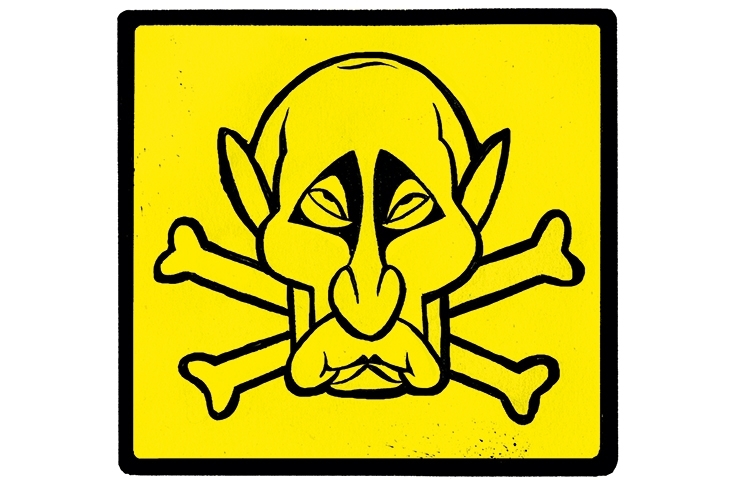If we are to believe the gossip, Vladimir Putin draws up death lists the way ordinary people jot down their shopping. And bang on schedule, as Joe Biden makes a point of labelling him a ‘killer,’ not one but two death lists materialise from parts unknown.
This weekend the Daily Mirror — not, it has to be said, usually a Kremlinologist’s ‘must-read’ — claimed that Putin is ‘now beside himself with rage’ and is drawing up lists of would-be victims, saying ‘we have long arms. No scum can hide from us.’ The quotes come from an unnamed office of Russia’s much-feared Federal Security Service (FSB), which is apparently planning how to execute Putin’s laundry list of kidnappings and murders.
Two of the alleged targets are key members of imprisoned opposition leader Alexei Navalny’s team: Vladimir Ashurkov, the director of his Foundation Against Corruption, now in asylum in London, and Leonid Volkov, Navalny’s chief of staff, now in Lithuania. Then there are two rich Russian critics of Putin’s also living in London, Mikhail Khodorkovsky and Evgeny Chichvarkin, as well as US-born investor and self-declared number one enemy of Putin, Bill Browder. Rounding out the list is Christopher Steele, the former MI6 officer whose salacious and dubious allegations about Donald Trump and his alleged Russian links generated such a storm.
Not mentioned in the snatch of Russian text provided but listed in the Mirror article is Boris Karpichkov, a defector from the FSB. He claimed to be on a similar hit list, communicated in a similar way, that included Sergei Skripal, although he appears to have publicised this only after the Salisbury poisoning.
We need to make sure we can tell the difference between a Bond film and real life
Apparently Volkov and Khodorkovsky are to be kidnapped and spirited into Russia. Ashurkov and Chichvarshin are to be poisoned with Novichok nerve agent. (And meanwhile Navalny himself to be driven to suicide in prison.)
All very dramatic, and in light of the well-documented poisoning attempts against both Skripal and Navalny, and a string of other murderous attacks, hard to discount entirely.
Yet at the same time, one should also be cautious. The notion that secret humanitarians within the FSB — an organisation noted for its ruthlessness — would break cover to pass on such a warning is heart-warming, but also hard to swallow. Pity the Moscow whistleblower who gets caught.
And getting caught would not be so hard. Like all intelligence services, the FSB compartmentalises to maintain operational security. If taken at face value, its author has knowledge of Putin’s state of mind and a whole series of separate operations, both the FSB’s but the Foreign Intelligence Service’s (SVR). That means someone both senior and directly involved.
One can wonder about the provenance of the list, especially as it comes at a time when the rhetorical campaign against the Kremlin is being stepped up on both sides of the Atlantic. (Let’s be honest, spin and disinformation are not Russian monopolies.)
Much of the detail is also problematic. Murdering an MI6 veteran? Kidnapping Khodorkovsky and whisking him away to Russia? The Kremlin may not worry too much about the risk of more sanctions, but it is not courting them.
Yet at the same time, the Times reported on a list of Chechens marked for death, leaked to ‘European intelligence agencies’ last year. Five names were reportedly on it — four of whom were already dead, one gone to ground in Austria. The most recent, Zelimkhan Khangoshvili, was shot dead in Berlin by a Russian gangster who seems linked to the FSB.
So here is the issue. The Kremlin demonstrably does kill, especially those it considers not just enemies but traitors, former insiders who have turned. It also seems to be getting more bloodthirsty, as Putin and his cronies worry about their futures and that the West is out to get them.
At the same time, there is violence and murder carried out not at the Kremlin’s orders but by oligarchs, officials and organised crime bosses in the pursuit of business and personal vendettas.
But then there are also supposedly suspicious deaths which are nothing but natural, and lurid claims which have no basis in fact.
We need to make sure we can tell the difference between a Bond film and real life. One of the problems with Steele’s dossier on Trump’s alleged relations with Russia was that it recounted the most lurid gossip doing the rounds in Moscow and Russian expat circles. People took its claims at face value if they fit their expectations. As we enter what may be a new phase of political confrontation with Russia, we need to be very clear on fact versus fiction.







Comments